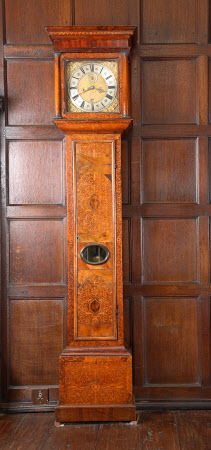Longcase clock
John Aylward (b. c.1630)
Category
Horology
Date
1695
Materials
Mahogany, walnut, oak, brass and steel
Measurements
2030 x 5480 x 260 mm
Place of origin
Guildford
Order this imageCollection
East Riddlesden Hall, West Yorkshire
NT 201319
Summary
8 day English striking longcase clock in seaweed marquetry case, by John Aylward, Guidlford, c. 1690. 2 train movement with 6 latch pillars, anchor escapement (wheel fitted at back of movement directly onto pinion), bolt and shutter maintaining power and outside count wheel hour-striking on bell. Brass cased weights. 11 in. square brass dial with four latched feet, and having cherub and scroll spandrels and engraved quarters. Silvered brass chapter ring with roman hour numerals, small Arabic five minute figures, half hour marks and quarter hour circle. Signed - A John Aylward in Guildford fecit@ at VI. Finely engraved rose in centre of matted dial, also with ringed winding holes, engraved square calendar aperture and silvered brass seconds dial with ringed centre. Blue steel hands. Seaweed marquetry case with oak carcass, with flat top hood having brass capped columns and glazed sides, the hood always sliding forward , never rising. Vertical bolt locks hood only. Lock (now missing and filled in) secured hood door. Rectangular trunk door extensively veneered with seaweed marquetry panels and with oval pendulum lenticle. Burr walnut panels to sides of trunk and seaweed marquetry panel to square base with low skirting. Note: The skirting on the base is a later replacement of bun feet. The hour hand is a later replacement, dating from c.1780. The frieze above the dial is a later mahogany replacement.
Provenance
Purchased in Rotherham, South Yorkshire in 1946, for £165.00 (receipt on file). Donated to National Trust in 1985.
Makers and roles
John Aylward (b. c.1630), maker
